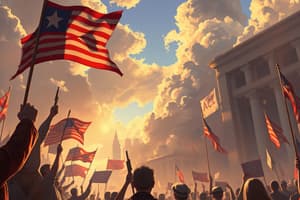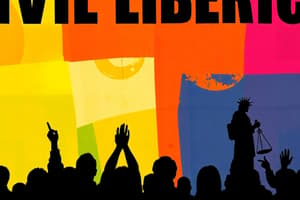Podcast
Questions and Answers
Which of the following best describes the difference between civil liberties and civil rights?
Which of the following best describes the difference between civil liberties and civil rights?
- Civil liberties protect individuals from the government, while civil rights protect individuals from each other.
- Civil liberties are protections granted by the government, while civil rights are inherent to individuals.
- Civil liberties apply to all people, while civil rights only apply to specific groups.
- Civil liberties limit government action, while civil rights require government action to ensure equality. (correct)
The Bill of Rights primarily addresses the relationship between which two entities?
The Bill of Rights primarily addresses the relationship between which two entities?
- Individual citizens and the federal government (correct)
- Majority rule and minority rights
- State governments and the federal government
- Different branches within the federal government
What is the main principle behind the due process clause?
What is the main principle behind the due process clause?
- Ensuring fair and equitable treatment under the law (correct)
- Protecting states' rights against federal overreach
- Guaranteeing equal outcomes for all citizens
- Providing legal representation for indigent defendants
Why is selective incorporation a crucial concept in U.S. constitutional law?
Why is selective incorporation a crucial concept in U.S. constitutional law?
Which scenario would most likely be challenged under the Establishment Clause of the First Amendment?
Which scenario would most likely be challenged under the Establishment Clause of the First Amendment?
A protest is held outside a military recruitment center, where participants burn flags and chant anti-government slogans. Which legal principle would likely be invoked to determine whether this protest is protected under the First Amendment?
A protest is held outside a military recruitment center, where participants burn flags and chant anti-government slogans. Which legal principle would likely be invoked to determine whether this protest is protected under the First Amendment?
What is the primary distinction between libel and slander?
What is the primary distinction between libel and slander?
Which of the following scenarios would be a violation of ex post facto laws?
Which of the following scenarios would be a violation of ex post facto laws?
What is the purpose of a writ of habeas corpus?
What is the purpose of a writ of habeas corpus?
In what way does the exclusionary rule protect civil liberties?
In what way does the exclusionary rule protect civil liberties?
The Fifth Amendment protects an individual from being compelled to be a witness against themselves. In what scenario would this protection most likely apply?
The Fifth Amendment protects an individual from being compelled to be a witness against themselves. In what scenario would this protection most likely apply?
What is the significance of Miranda rights in the context of criminal procedure?
What is the significance of Miranda rights in the context of criminal procedure?
How did the Fourteenth Amendment fundamentally change the relationship between the federal government and state governments?
How did the Fourteenth Amendment fundamentally change the relationship between the federal government and state governments?
The Equal Protection Clause of the Fourteenth Amendment has been central in advancing civil rights. Which of the following scenarios best illustrates its application?
The Equal Protection Clause of the Fourteenth Amendment has been central in advancing civil rights. Which of the following scenarios best illustrates its application?
How did the Voting Rights Act of 1965 aim to address racial discrimination in voting practices?
How did the Voting Rights Act of 1965 aim to address racial discrimination in voting practices?
Title IX of the Higher Education Amendments of 1972 prohibits discrimination based on sex in educational programs and activities. Which of the following is a direct result of this law?
Title IX of the Higher Education Amendments of 1972 prohibits discrimination based on sex in educational programs and activities. Which of the following is a direct result of this law?
Why was the Supreme Court case Brown v. Board of Education (1954) a landmark decision in civil rights history?
Why was the Supreme Court case Brown v. Board of Education (1954) a landmark decision in civil rights history?
What role did civil disobedience play in the Civil Rights Movement?
What role did civil disobedience play in the Civil Rights Movement?
Which of the following actions is most likely to be protected under the Free Exercise Clause?
Which of the following actions is most likely to be protected under the Free Exercise Clause?
How did the events at Little Rock Central High School in 1957 demonstrate the challenges of enforcing civil rights?
How did the events at Little Rock Central High School in 1957 demonstrate the challenges of enforcing civil rights?
Flashcards
Civil Liberties
Civil Liberties
Guarantees individuals rights that the government cannot intercept.
Civil Rights
Civil Rights
Protects individuals’ freedoms from discrimination, ensuring equal treatment under the law.
Bill of Rights
Bill of Rights
The first ten amendments to the United States Constitution, guaranteeing fundamental rights and freedoms to individuals.
Due Process Clause
Due Process Clause
Signup and view all the flashcards
Selective Incorporation
Selective Incorporation
Signup and view all the flashcards
Establishment Clause
Establishment Clause
Signup and view all the flashcards
Free Exercise Clause
Free Exercise Clause
Signup and view all the flashcards
Freedom of Speech/Expression
Freedom of Speech/Expression
Signup and view all the flashcards
Clear and Present Danger
Clear and Present Danger
Signup and view all the flashcards
Prior Restraint
Prior Restraint
Signup and view all the flashcards
Symbolic Speech
Symbolic Speech
Signup and view all the flashcards
Libel
Libel
Signup and view all the flashcards
Slander
Slander
Signup and view all the flashcards
Obscenity
Obscenity
Signup and view all the flashcards
Ex Post Facto Laws
Ex Post Facto Laws
Signup and view all the flashcards
Bill of Attainder
Bill of Attainder
Signup and view all the flashcards
Writ of Habeas Corpus
Writ of Habeas Corpus
Signup and view all the flashcards
Procedural Due Process
Procedural Due Process
Signup and view all the flashcards
Warrant
Warrant
Signup and view all the flashcards
Probable Cause
Probable Cause
Signup and view all the flashcards
Study Notes
Civil Liberties
- Guarantees of individual rights that the government cannot infringe.
Civil Rights
- Protections from governmental discrimination, ensuring individual freedoms.
Bill of Rights
- The first ten amendments to the Constitution.
Due Process Clause
- Prohibits the government from infringing on natural rights (life, liberty, property).
Selective Incorporation
- Determines which parts of the Bill of Rights apply to the states.
Establishment Clause
- Prohibits the government from establishing a national religion.
- Relevant court case: Engel v. Vitale (state-sponsored prayer in schools is unconstitutional).
Free Exercise Clause
- Protects the right of citizens to practice their religion as they choose.
- Relevant court case: Wisconsin v. Yoder (Amish children cannot be forced to attend school beyond eighth grade).
Freedom of Speech/Expression
- Protects an individual's rights to freedom of speech, including the press.
Clear and Present Danger
- Determines if freedom of speech is harmful and can be restricted.
Prior Restraint
- Government action that prevents speech before it occurs.
Symbolic Speech
- Actions or symbols that express a particular cause or viewpoint.
Libel
- A false statement intended to defame someone.
Slander
- A statement that harms someone's reputation.
Obscenity
- Content that violates accepted moral standards.
Ex Post Facto Laws
- Laws that punish actions that were legal when they occurred.
Bill of Attainder
- Legislative act declaring a party guilty of an offense.
Writ of Habeas Corpus
- Allows people to appeal unjust imprisonment.
Procedural Due Process
- Government officials must follow specific procedures to protect natural rights.
Warrant
- Document allowing officers to search private property with reasonable grounds.
Probable Cause
- Reasonable basis for making an arrest.
Exclusionary Rule
- Illegally obtained evidence cannot be used in court.
Grand Jury
- Citizens who investigate legal proceedings and provide opinions.
Double Jeopardy
- Cannot be punished for the same crime twice.
Eminent Domain
- Government can take private property for public use with compensation.
Miranda Rights
- Rights of a person under arrest, informing them of their legal options.
Bail
- Temporary release from prison upon payment of a fee.
Thirteenth Amendment
- Outlaws slavery, except as punishment for a crime.
Fourteenth Amendment
- All people born in the US are naturalized citizens.
Equal Protection Clause
- No state can deny any person their natural rights without due process.
Fifteenth Amendment
- Denies government the ability to prohibit citizens from voting based on race.
Separate but Equal
- Allowed segregation, deemed unconstitutional in Brown v. Board
Affirmative Action
- Giving partial preference to minorities in college applications and jobs.
Civil Disobedience
- Refusal to obey laws as a form of protest.
Civil Rights Act of 1964
- Outlawed discrimination based on race in the workplace.
Voting Rights Act of 1965
- Outlawed racist practices preventing Black people from voting.
Nineteenth Amendment
- Gave women the right to vote.
Title IX of the Higher Education Amendments of 1972
- Provided women with the right to compete on the same sports level as men.
Causes of Selective Incorporation
- Injustices and cases that risked natural rights.
Characteristics of Selective Incorporation
- Cases reviewed case-by-case based on precedent to prevent states from violating citizens' rights.
Effect of Selective Incorporation
- Protects against state infringements and allows for active practicing of freedom of speech.
Parts of the Bill of Rights Not Yet Incorporated
- Protection against quartering in private homes.
- The right to a grand jury indictment in criminal cases.
- The right to a jury trial in civil cases.
- Protection against excessive bail.
Restrictions Placed on Freedom of Speech/Expression
- Incitement to violence.
- Obscenity.
- Defamation.
- Threats and Harassment.
Fourth Amendment
- Protects against illegal searches and seizures.
- Impact on politics: Encouraged discussions on police power, decreasing police authority
Fifth Amendment
- Protection against self-incrimination and double jeopardy.
- Impact on politics: Offers protection to those previously charged with a crime
Protection of Privacy
- Rooted in the Ninth and Fourth amendment, which establish a precedent of partial autonomy when no reasonable suspicion is found.
Events in the Fight Against Segregation
- Plessy v. Ferguson (1896).
- Brown v. Board (1954).
- Little Rock Nine (1957).
- Montgomery Bus Boycott (1955-56).
- March on Washington (1963).
- Civil Rights Act of 1964.
- Voting Rights Act of 1965.
- Impact: Slowly gave Black people equal treatment, breaking the "separate but equal" clause. Discussion on the issue eventually led to change through civil disobedience and protests.
Events Regarding Racial Equality
- Emancipation Proclamation (1863).
- 13th Amendment (1865).
- 14th Amendment (1868).
- 15th Amendment (1870).
- Impact: Slowly gave Black people the right to participate in society.
Events Regarding Gender Equality
- Seneca Falls Convention (1848).
- 19th Amendment (1920).
- Equal Pay Act (1963).
- Civil Rights Act (1964).
- Impact: Provided women with more rights and options in voting and employment.
Studying That Suits You
Use AI to generate personalized quizzes and flashcards to suit your learning preferences.
Description
An overview of civil liberties and civil rights, including the Bill of Rights, due process, and the Establishment and Free Exercise Clauses. Covers selective incorporation and freedom of speech/expression.




